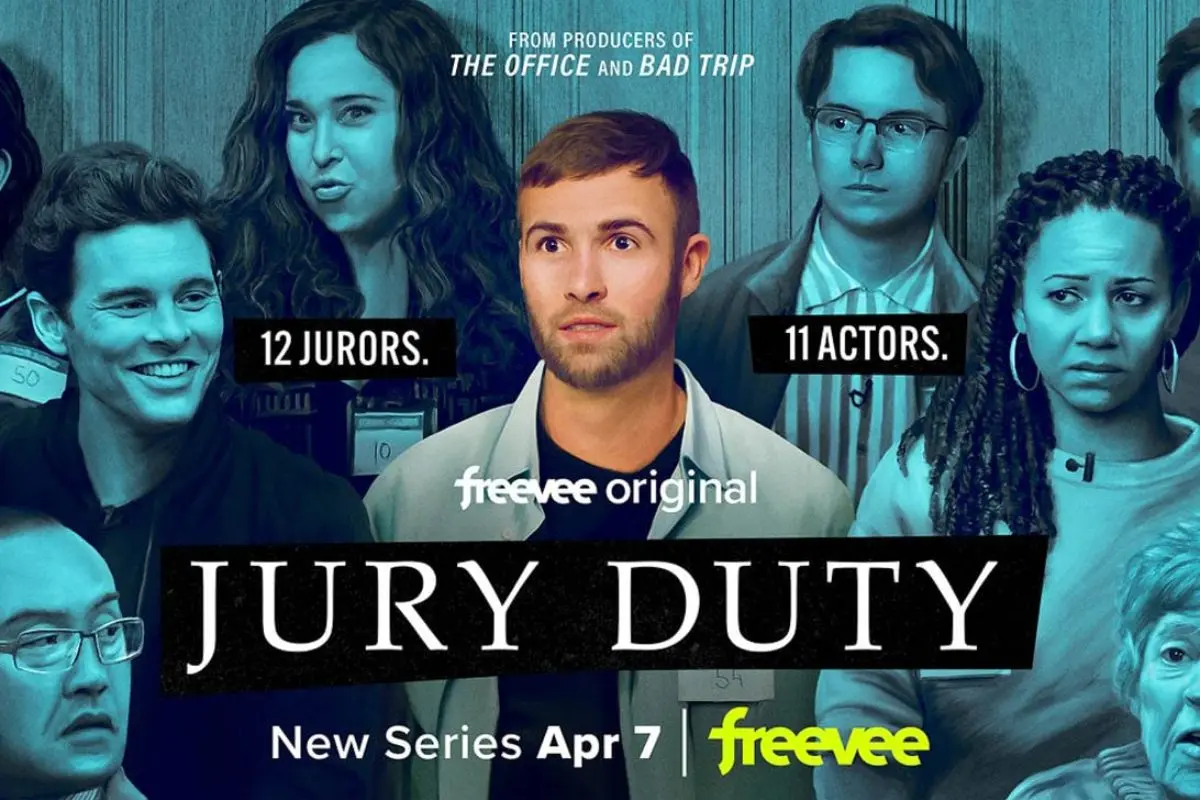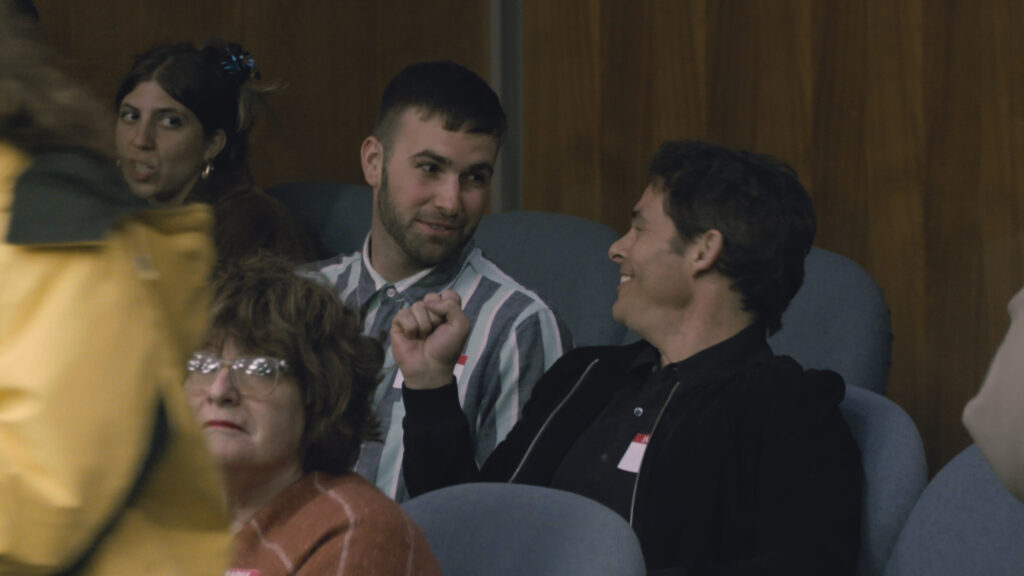
Jury Duty | Between comedy and reality TV in the name of kindness
Seasons
Runtime
By
At the beginning of each episode of Jury Duty, the production reminds viewers of the very premise of the show. What they are about to see (or continue to see) is a documentary about a civil trial in California between a businesswoman and her employee who allegedly caused great damage to the company. The purpose of the documentary is to testify to the functioning of the American legal system, in particular focusing on jury duty and the jurors themselves, on their reasoning and on how they experience their task. Especially when they are forced to remain locked up in a hotel for almost 20 days without being able to communicate with the outside world – apart from court staff.
Except, however, that Jury Duty is not a real documentary. There is no trial, no judge, no jurors, no defendant or accuser. It’s all a show, they’re all actors. All except one, Ronald Gladden, who instead believes he is a real juror in a real trial, and has every intention of completing his task, despite the oddities that continue to happen around him.
Jury Duty is a TV show produced by Lee Eisenberg and Gene Stupnitsky, former writers and producers of The Office, and directed by Jake Szymanski. First distributed by Freevee, a streaming service owned by Amazon, and then directly by Prime Video after its explosive success, it falls under the Reality TV hoax genre. Despite the danger, for Ronald, of becoming a victim of situations, ridiculing himself and showing the worst of himself as often happens in other reality shows or in the more classic Candid Camera-style prank programs, what emerges from Jury Duty instead is an incentive to kindness and empathy, to always do the right thing.
The Hoax
Jury Duty, being a fake documentary, uses the mockumentary technique to carry forward its narrative, a tool also known in other productions such as Rehearsal, created by Nathan Fielde, which, like Jury Duty, presents itself halfway between a show and a reality show to express the inconsistencies and facets of the human soul.
Among the jury made up of actors, in Jury Duty there is also a well-known face, James Marsden, known for his roles in the X-Men saga and Westworld. Marsden plays himself, making himself a caricature by adopting strange habits and eccentric and self-centered attitudes.
The rest of the jury represents a varied melting pot of personalities, each with an ever-changing assigned role. Among them are the boyfriend who gave up the holiday with his better half, the teacher with marital problems, the technology addict, the narcoleptic old lady, the cynical realist, the aspiring jury president, the wannabe detective, the young girl flirting shamelessly. Each of them provides insights for Ronald’s personality to show itself in its nuances.
The climax happens in the last episode, in which Jake Szymanski’s direction shows itself for what it is: the tricks are revealed in Ronald’s eyes. The confessions, the wiretaps and each shot illustrate the progressive evolution of the protagonist’s adventures, the situations created ad hoc and how everyone tried to put Ronald in difficulty. The true essence of Jury Duty is shown, the background and the mechanisms to make the hoax possible, explaining how the production, after having initially attracted more than 2500 candidates for the documentary, found the winning choice in Ronald Gladden, thanks to two characteristics that shows of this kind are often considered marginal: resilience and kindness.
The power of kindness
In a television landscape dominated by reality and prank shows that often feed on the cynicism and derision of the victims, Jury Duty triumphs over sarcasm. The laughter is shared with the victim, and not at his expense. Ronald Gladden becomes not the target of laughter, but the heart of a heroic journey.
We wanted to give Ronald a little hero’s journey where he becomes the leader of this pack of eccentric weirdos, and he kind of is the glue that holds them together.
Showrunner Cody Heller
The humor therefore comes from Ronald’s ability to deal with bizarre situations with dignity and compassion. A example is that expressed by the director of Jury Duty himself in an interview for the Commotion podcast: during a surprise birthday party organized for one of the jurors, James Marsden, given his egocentrism, destroys the birthday cake in a moment of anger. In a typical sitcom it is a common trope, generating laughs and narrative conflict. But in this case, as a result, Ronald closed himself off, visibly irritated by Marsden’s behavior after his commitment to organizing the party, but without expressing himself so as not to start a fight with the actor. James Marsden himself felt guilty for appearing in this guise in front of Gladden’s eyes, so the production, still incognito, found a way to remedy the mistake and continue with the party.
The limit between reality and fiction is therefore very blurred. What the viewer is used to finding funny in a TV show may not work in reality, creating an uncomfortable situation.
Nowadays, Ronald is a familiar face. He even participated in some advertisements together with Ryan Reynolds, and his story is taken as an example of the fact that in a world full of negativity there is still room for kindness. And that everyone, as ordinary men, can do their part: together, we can make others’ lives actually better.
The genuinesse of emotions
While the majority of the public appreciated the TV show, some felt that it lacked the comedic element typical of television pranks, because it broke the tradition of exploiting other people’s misfortunes for entertainment. This raises questions about society’s preferences for enjoying the misfortunes of others and the attraction of reality shows.
Reality television has the ability to mix information and entertainment, offering a window into human behavior. The voyeuristic nature of these shows allows viewers to observe and learn from what others do, sparking reflections on how each of us would deal with similar situations. The attraction to human drama, difficult decisions and emotional connection contribute to the success of such programs. Identifying with preferred participants reveals significant aspects of ourselves, opening spaces for personal exploration.
But playing with people’s real feelings, which in fact could be said to happen in Jury Duty as well, is sparking discussion about whether that format is in fact harmful to participants.
Gladden himself said in fact that for some time he felt constantly spied on and developed a brief period characterized by a lack of trust in others.
Some of the public wonder about whether or not it is ethical to manipulate, even if with good intentions, a person who is completely unaware of everything. The debate is still open, even if most opinions tend to consider Jury Duty not so much along the lines of a modern Truman Show, but more of a product which, in the Ted Lasso effect, explores the positivity of people, often put in second place in favor of the conflict.
A one-shot show?
Rather than indulging in shows that glorify narcissism and sensationalism, Jury Duty is an opportunity to consciously seek out empathy, kindness, and a touch of normalcy. The protagonist and victim Ronald Gladden forged genuine bonds with his fellow ‘jurors’. He maintains friendships with all the actors from Jury Duty challenging the conventional norms of reality television, where exploitation and dramatic twists often take center stage.
But, even if everything had a happy ending, the potential for additional seasons of Jury Duty presents challenges in maintaining its appeal. Second seasons often require heightened stakes to retain audience interest, but the show, rooted in subtlety rather than grand gestures, must navigate carefully to avoid making its unsuspecting subjects the victims of the joke. Ronald’s reliability and niceness were crucial in addressing potential ethical concerns for the producers and ensuring a positive viewer experience.
Examining the broader landscape of prank shows, such as Sacha Baron Cohen‘s work like Borat, highlights the inherent difficulty of sustaining such endeavors over time. Familiarity with these characters diminishes the element of surprise, leading to the retirement of these personas. The notoriety gained from pranking Ronald signals a potential end to large-scale fake documentary scams, especially within a courtroom setting. The success of the show hinges on its one-time execution, showcasing the makers’ awareness of the limitations of their concept.
Right now, viewers can learn more about Jury Duty by waiting to see whether or not it triumphs at the Primetime Emmy Awards, where it is nominated for Outstanding Comedy Series, Outstanding Supporting Actor and Outstanding Writing for a Comedy Series and at the Golden Globes, where it’s nominated for Best Television Series – Musical or Comedy and Best Supporting Actor.

Tag
Buy a ☕ for Hypercritic









